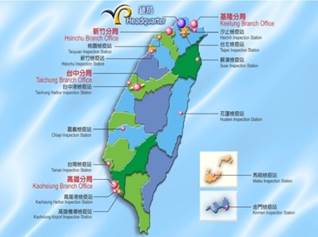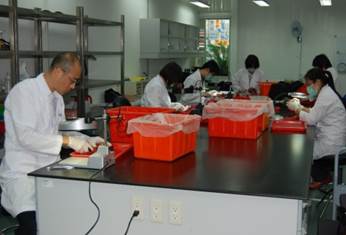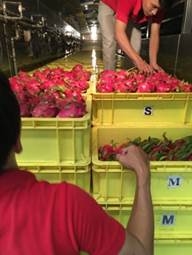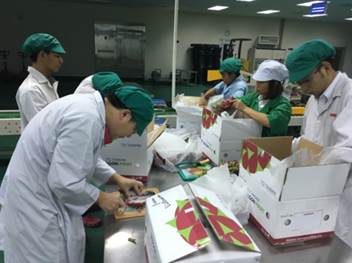ABSTRACT
The Plant Quarantine Division of the Bureau of Animal and Plant Health Inspection and Quarantine (BAPHIQ) is in charge of the plant import and export quarantine and inspection affairs. For plants and plant products to be exported to other countries, BAPHIQ conducts the inspection or quarantine treatments according to the requirements of importing countries. For exporting dragon fruits (Hylocereus undatus) to Japan, vapor heat treatment is requested. On the other hand, according to Taiwan’s regulations, if plants or plant products have no import records, the Pest Risk Assessment (PRA) is requested. The import requirements are decided based on the results of the PRA. Taiwan imports dragon fruits from Viet Nam and Malaysia. All dragon fruits imported from Viet Nam shall be treated with vapor heat according to requirements that both sides agree.
Keywords: dragon fruits, quarantine, fruit flies, exportation, importation
INTRODUCTION
The Bureau of Animal and Plant Health Inspection and Quarantine (BAPHIQ) was formally established on August 1, 1998. It consists of four branches which are the Keelung, Hsinchu, Taichung and Kaohsiung branches and many stations. All branches and stations are jointly responsible for affairs pertaining to plant and animal inspection and quarantine of Taiwan.
The BAPHIQ headquarter has the following divisions: Planning, Animal Health Inspection, Animal Quarantine, Plant Protection, Plant Quarantine, Meat Inspection Divisions. They work closely together to safeguard and ensure the quality and sanitation of all agricultural products entering Taiwan. In addition, the Bureau is responsible for quarantine services and prevention and control of important animal and plant diseases and pests. These measures promote the development of Taiwan’s agriculture, protect natural resources, and safeguard the health of our people.

Fig. 1. The Distribution of BAPHIQ, its branch offices and stations
For the plant quarantine aspect, we conduct inspections of import and export plants and plant products at seaports, airports, international mail centers and fields. Moreover, BAPHIQ supervises and conducts quarantine treatments for importing and exporting plants or plant products. As a member of WTO, all these procedures or requirements are based on international regulations such as the SPS (Sanitary and Phytosanitary) agreement, the International Standards for Phytosanitary Measures (ISPM), and Taiwan’s regulations such as the “Plant Protection and Quarantine Act”, “Enforcement Rules on Protection and Quarantine Act” and so forth.
EXPORTATION
For exporting plants and plant products to other countries, BAPHIQ conducts visual inspections, field inspections, quarantine treatments, or laboratory examination according to the quarantine requirements that both the importing countries and Taiwan agreed upon. Because there are various quarantine requirements for exportation, BAPHIQ established a website (https://export.baphiq.gov.tw/coa/hotnews_idx.php) listing these requirements for exporters’ references. When our people require an export inspection, they can raise their application through the internet, FAX or contact the branches or stations directly based on the requirements of importing countries. After completing the inspection, a phytosanitary certificate will be issued when the consignments fulfill the quarantine requirements.
Table 1. The quantity and values of Taiwanese vegetables and fruits exports
|
Items
|
2015
|
2016
|
2017
|
|
Vegetables
|
quantity (tons)
|
108,007
|
99,591
|
22,690
|
|
|
value (thousand USD)
|
166,575
|
160,564
|
18,500
|
|
Fruits
|
quantity (tons)
|
130,930
|
116,901
|
55,265
|
|
|
value (thousand USD)
|
238,040
|
214,269
|
104,081
|
Because Oriental fruit flies (OFFs, Bactrocela dorsalis) occur in Taiwan, fruits produced in our territory always have pest concerns by importing countries; therefore, necessary treatments might be required according to the requirements of the importing countries. For example, when exporting dragon fruits (Hylocereus undatus) to Japan were being plannted, BAPHIQ prepared a series of reports of quarantine treatments for OFFs including the methods of inoculation and the trial of disinfestations treatment (vapor heat treatment, VHT). BAPHIQ submitted comprehensive dossiers to Japan in 2004. After conducting a complete and careful review for about five years, Japan sent an inspector to Taiwan to confirm the effectiveness of experiments of VHT in 2009 and then finally opened their market in 2010. All dragon fruits shall be treated with VHT before exportation to eliminate OFFs. Besides dragon fruits, based on hard work from past decades, Taiwan now can export litchi, ponkan, grapes, mangos, wentans, pomelos, papayas, pitayas and jujube to Japan. All fruits exported to Japan need to have quarantine treatment conducted to eliminate OFFs.

Fig. 2. The on-site inspections by Japan’s inspector
IMPORTATION
According to Taiwan’s regulations, if plants or plant products have no import records, the Pest Risk Assessment (PRA) is requested. The National Plant Protection Organizations (NPPOs) of exporting countries have to provide relevant information of the plants or plant products, such as the production areas, growth properties, propagation methods, climatic conditions for growing them, yields, harvest seasons, the post-harvest processes, pest lists, information regarding pest control and the list of chemicals used. If certain fruit flies occur in the exporting countries, the NPPO must also provide the report of disinfestation trials for the fruit flies for this commodity; otherwise, there must be an application to recognize the pest free status of the pests mentioned above. If it is necessary, Taiwan will dispatch officials to the exporting countries to conduct on-site verifications. After completing the verification, the plant or plant products from exporting countries may be allowed to export to Taiwan by complying with certain quarantine requirements. In addition, all costs for conducting on-site verifications shall be borne by exporting countries. The import quarantine for the plants or plant products will be decided based on the results of PRA.
In addition, the import requirements are divided intoportions that are prohibited and can be imported. For the prohibited part, BAPHIQ lists the pests we are concerned about with their hosts with scientific names and the infested areas. In the where imports are allowed, the phytosanitary requirements for additional declarations on phytosanitary certificates are listed for the plants or plant products imported to Taiwan. For example, the “Quarantine Requirements for the Importation of Fresh Dragon Fruits (Hylocereus undatus) from Viet Nam” is one of the Requirements. Dragon fruits are hosts of guava fruit flies (Bactrocera correcta), and Viet Nam is an infested area. Therefore, dragon fruits from Viet Nam were prohibited. In order to access the market of Taiwan, Viet Nam provided the required documents for the PRA to Taiwan. After reviewing the papers provided by Viet Nam and sending inspectors to Viet Nam to verify the effectiveness of the experiments of vapor heat treatments, BAPHIQ drafted the Quarantine Requirements for Viet Nam’s review including the requirements with vapor heat treatment under 46.8℃ for 40 minutes. The Quarantine Requirements were agreed upon by both sides and entered into force in 2016. According to the Quarantine Requirements, Viet Nam needs to conduct the management of orchards, packing houses, and VHT facilities. BAPHIQ also sends inspectors to Viet Nam to conduct on-site inspections during the exporting season every year.

Fig. 3. The vapor heat treatment of dragon fruits in Viet Nam

Fig. 4. The export inspections in Viet Nam when exporting to Taiwan
CONCLUSION
Plant quarantine is an enforcement of measures to prevent pests from spreading to established restricted areas. BAPHIQ, as the NPPO of Taiwan, is responsible for import and export inspections in orchards, ports, and international mail centers and so forth. In international trade, dragon fruits are important plant products. Taiwan exports dragon fruits to Japan and imports them from Viet Nam and Malaysia. Because of different pest statuses, dragon fruits have to be treated with vapor heat when exporting to Japan and importing from Viet Nam. Fruit flies are major international pests especially in trading of fruits. Taiwan will continue studying the improvement of quarantine treatments and cooperate with foreign countries to conduct the PRA and quarantine treatments as well as achieving the goal of protecting our environment with facilitate trading.
REFERENCES
Anonymous. 2018. Quarantine requirement for the importation of plants or plant products into the Republic of China. (https://www.baphiq.gov.tw/en/view.php?catid=11712; Accessed 27 March 2018)
Anonymous. 2018. About BAPHIQ (https://www.baphiq.gov.tw/en/view.php?catid=11612, Accessed 27 March 2018).
Anonymous. 2018. Statistics. (https://eng.coa.gov.tw/ws.php?id=8821; Accessed 29 March 2018)
林高偉、王堂凱、陳盈志. 2017. 越南白肉種紅龍果鮮果實輸入檢疫作業,動植物防疫檢疫局季刊 52: 8-10
| (Submitted as a technical report for the Dragon Fruit Regional Network Initiation Workshop, April 23-24, 2018, Taipei, Taiwan) |


Quarantine Requirements for the Importation and Exportation of Dragon Fruits in Taiwan
ABSTRACT
The Plant Quarantine Division of the Bureau of Animal and Plant Health Inspection and Quarantine (BAPHIQ) is in charge of the plant import and export quarantine and inspection affairs. For plants and plant products to be exported to other countries, BAPHIQ conducts the inspection or quarantine treatments according to the requirements of importing countries. For exporting dragon fruits (Hylocereus undatus) to Japan, vapor heat treatment is requested. On the other hand, according to Taiwan’s regulations, if plants or plant products have no import records, the Pest Risk Assessment (PRA) is requested. The import requirements are decided based on the results of the PRA. Taiwan imports dragon fruits from Viet Nam and Malaysia. All dragon fruits imported from Viet Nam shall be treated with vapor heat according to requirements that both sides agree.
Keywords: dragon fruits, quarantine, fruit flies, exportation, importation
INTRODUCTION
The Bureau of Animal and Plant Health Inspection and Quarantine (BAPHIQ) was formally established on August 1, 1998. It consists of four branches which are the Keelung, Hsinchu, Taichung and Kaohsiung branches and many stations. All branches and stations are jointly responsible for affairs pertaining to plant and animal inspection and quarantine of Taiwan.
The BAPHIQ headquarter has the following divisions: Planning, Animal Health Inspection, Animal Quarantine, Plant Protection, Plant Quarantine, Meat Inspection Divisions. They work closely together to safeguard and ensure the quality and sanitation of all agricultural products entering Taiwan. In addition, the Bureau is responsible for quarantine services and prevention and control of important animal and plant diseases and pests. These measures promote the development of Taiwan’s agriculture, protect natural resources, and safeguard the health of our people.
Fig. 1. The Distribution of BAPHIQ, its branch offices and stations
For the plant quarantine aspect, we conduct inspections of import and export plants and plant products at seaports, airports, international mail centers and fields. Moreover, BAPHIQ supervises and conducts quarantine treatments for importing and exporting plants or plant products. As a member of WTO, all these procedures or requirements are based on international regulations such as the SPS (Sanitary and Phytosanitary) agreement, the International Standards for Phytosanitary Measures (ISPM), and Taiwan’s regulations such as the “Plant Protection and Quarantine Act”, “Enforcement Rules on Protection and Quarantine Act” and so forth.
EXPORTATION
For exporting plants and plant products to other countries, BAPHIQ conducts visual inspections, field inspections, quarantine treatments, or laboratory examination according to the quarantine requirements that both the importing countries and Taiwan agreed upon. Because there are various quarantine requirements for exportation, BAPHIQ established a website (https://export.baphiq.gov.tw/coa/hotnews_idx.php) listing these requirements for exporters’ references. When our people require an export inspection, they can raise their application through the internet, FAX or contact the branches or stations directly based on the requirements of importing countries. After completing the inspection, a phytosanitary certificate will be issued when the consignments fulfill the quarantine requirements.
Table 1. The quantity and values of Taiwanese vegetables and fruits exports
Items
2015
2016
2017
Vegetables
quantity (tons)
108,007
99,591
22,690
value (thousand USD)
166,575
160,564
18,500
Fruits
quantity (tons)
130,930
116,901
55,265
value (thousand USD)
238,040
214,269
104,081
Because Oriental fruit flies (OFFs, Bactrocela dorsalis) occur in Taiwan, fruits produced in our territory always have pest concerns by importing countries; therefore, necessary treatments might be required according to the requirements of the importing countries. For example, when exporting dragon fruits (Hylocereus undatus) to Japan were being plannted, BAPHIQ prepared a series of reports of quarantine treatments for OFFs including the methods of inoculation and the trial of disinfestations treatment (vapor heat treatment, VHT). BAPHIQ submitted comprehensive dossiers to Japan in 2004. After conducting a complete and careful review for about five years, Japan sent an inspector to Taiwan to confirm the effectiveness of experiments of VHT in 2009 and then finally opened their market in 2010. All dragon fruits shall be treated with VHT before exportation to eliminate OFFs. Besides dragon fruits, based on hard work from past decades, Taiwan now can export litchi, ponkan, grapes, mangos, wentans, pomelos, papayas, pitayas and jujube to Japan. All fruits exported to Japan need to have quarantine treatment conducted to eliminate OFFs.
Fig. 2. The on-site inspections by Japan’s inspector
IMPORTATION
According to Taiwan’s regulations, if plants or plant products have no import records, the Pest Risk Assessment (PRA) is requested. The National Plant Protection Organizations (NPPOs) of exporting countries have to provide relevant information of the plants or plant products, such as the production areas, growth properties, propagation methods, climatic conditions for growing them, yields, harvest seasons, the post-harvest processes, pest lists, information regarding pest control and the list of chemicals used. If certain fruit flies occur in the exporting countries, the NPPO must also provide the report of disinfestation trials for the fruit flies for this commodity; otherwise, there must be an application to recognize the pest free status of the pests mentioned above. If it is necessary, Taiwan will dispatch officials to the exporting countries to conduct on-site verifications. After completing the verification, the plant or plant products from exporting countries may be allowed to export to Taiwan by complying with certain quarantine requirements. In addition, all costs for conducting on-site verifications shall be borne by exporting countries. The import quarantine for the plants or plant products will be decided based on the results of PRA.
In addition, the import requirements are divided intoportions that are prohibited and can be imported. For the prohibited part, BAPHIQ lists the pests we are concerned about with their hosts with scientific names and the infested areas. In the where imports are allowed, the phytosanitary requirements for additional declarations on phytosanitary certificates are listed for the plants or plant products imported to Taiwan. For example, the “Quarantine Requirements for the Importation of Fresh Dragon Fruits (Hylocereus undatus) from Viet Nam” is one of the Requirements. Dragon fruits are hosts of guava fruit flies (Bactrocera correcta), and Viet Nam is an infested area. Therefore, dragon fruits from Viet Nam were prohibited. In order to access the market of Taiwan, Viet Nam provided the required documents for the PRA to Taiwan. After reviewing the papers provided by Viet Nam and sending inspectors to Viet Nam to verify the effectiveness of the experiments of vapor heat treatments, BAPHIQ drafted the Quarantine Requirements for Viet Nam’s review including the requirements with vapor heat treatment under 46.8℃ for 40 minutes. The Quarantine Requirements were agreed upon by both sides and entered into force in 2016. According to the Quarantine Requirements, Viet Nam needs to conduct the management of orchards, packing houses, and VHT facilities. BAPHIQ also sends inspectors to Viet Nam to conduct on-site inspections during the exporting season every year.
Fig. 3. The vapor heat treatment of dragon fruits in Viet Nam
Fig. 4. The export inspections in Viet Nam when exporting to Taiwan
CONCLUSION
Plant quarantine is an enforcement of measures to prevent pests from spreading to established restricted areas. BAPHIQ, as the NPPO of Taiwan, is responsible for import and export inspections in orchards, ports, and international mail centers and so forth. In international trade, dragon fruits are important plant products. Taiwan exports dragon fruits to Japan and imports them from Viet Nam and Malaysia. Because of different pest statuses, dragon fruits have to be treated with vapor heat when exporting to Japan and importing from Viet Nam. Fruit flies are major international pests especially in trading of fruits. Taiwan will continue studying the improvement of quarantine treatments and cooperate with foreign countries to conduct the PRA and quarantine treatments as well as achieving the goal of protecting our environment with facilitate trading.
REFERENCES
Anonymous. 2018. Quarantine requirement for the importation of plants or plant products into the Republic of China. (https://www.baphiq.gov.tw/en/view.php?catid=11712; Accessed 27 March 2018)
Anonymous. 2018. About BAPHIQ (https://www.baphiq.gov.tw/en/view.php?catid=11612, Accessed 27 March 2018).
Anonymous. 2018. Statistics. (https://eng.coa.gov.tw/ws.php?id=8821; Accessed 29 March 2018)
林高偉、王堂凱、陳盈志. 2017. 越南白肉種紅龍果鮮果實輸入檢疫作業,動植物防疫檢疫局季刊 52: 8-10